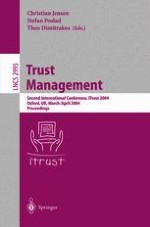2004 | Buch
Trust Management
Second International Conference, iTrust 2004, Oxford, UK, March 29 - April 1, 2004. Proceedings
herausgegeben von: Christian Jensen, Stefan Poslad, Theo Dimitrakos
Verlag: Springer Berlin Heidelberg
Buchreihe : Lecture Notes in Computer Science
Enthalten in: Professional Book Archive
